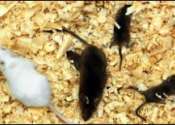Gene therapy slows vision loss in mouse models of retinal degeneration
Researchers have developed an antioxidant gene therapy that slows cone-cell death and prolongs vision in mouse models of retinal degeneration.
Mar 24, 2015
0
56
Researchers have developed an antioxidant gene therapy that slows cone-cell death and prolongs vision in mouse models of retinal degeneration.
Mar 24, 2015
0
56

A newly developed mouse model suggests that genetic factors are behind the mild-to-deadly range of reactions to the Ebola virus.
Oct 30, 2014
1
0

Researchers including Jackson Laboratory Professor Gary Churchill, Ph.D., have found a single nucleotide polymorphism (SNP) difference in cocaine and methamphetamine response between two substrains of the C57BL/6 or "Black ...
Dec 19, 2013
1
0

Every year, more than 16,000 Americans die as a result of what's known as an "aortic dissection"—a catastrophic rupture of the aorta, the body's largest artery. Once thought to be a simple structural failure, aortic dissection ...
Jun 20, 2013
0
0
Setting a mouse free to roam might alarm most people, but not so for nuclear imaging researchers from the U.S. Department of Energy's Thomas Jefferson National Accelerator Facility, Oak Ridge National Laboratory, Johns Hopkins ...
Apr 9, 2013
0
0
In diseases like Alzheimer's and Parkinson's endogenous proteins accumulate in the brain, eventually leading to the death of nerve cells. These deposits, which consist of abnormally formed proteins, are supposed to migrate ...
Mar 27, 2013
0
0
Pre-clinical trials—the stage at which medications or therapies are tested on animals like laboratory mice—is a crucial part of drug development. It's only then that scientists can assess benefits and side effects before ...
Dec 13, 2012
0
0
A University of Cincinnati (UC) Cancer Institute lung cancer research team reports that lung cancer stem cells can be isolated—and then grown—in a preclinical model, offering a new avenue for investigating immunotherapy ...
Nov 13, 2012
0
0
Researchers at Cedars-Sinai's Maxine Dunitz Neurosurgical Institute have found that a blood vessel-building gene boosts the ability of human bone marrow stem cells to sustain pancreatic recovery in a laboratory mouse model ...
Oct 2, 2012
0
0
A new gene therapy approach can reverse hearing loss caused by a genetic defect in a mouse model of congenital deafness, according to a preclinical study published by Cell Press in the July 26 issue of the journal Neuron. ...
Jul 25, 2012
0
0